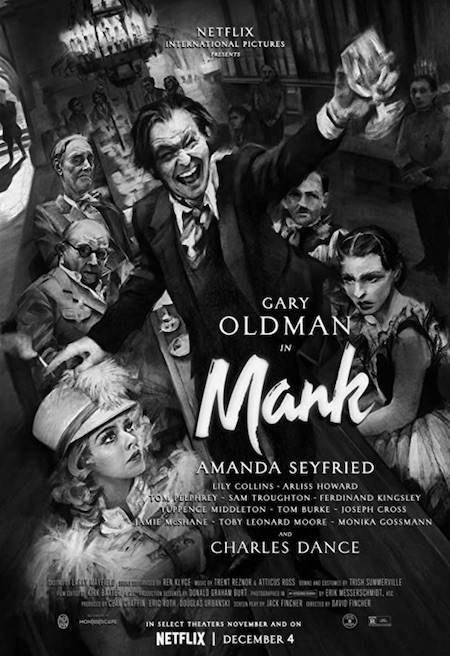

Mank (David Fincher, 2020) wr. Jack Fincher; prod. Ceán Chaffin, Eric Roth, Douglas Urbanski; Gary Oldman, Amanda Seyfried, Lily Collins, Arliss Howard, Tom Pelphrey, Charles Dance, Sam Troughton, Tom Burke; biopic; Netflix; 1930s Hollywood re-evaluated through the eyes of scathing social critic and alcoholic screenwriter Herman J. Mankiewicz as he races to finish the screenplay of Citizen Kane
Henry K. Miller:
Mank’s film history oscillates between the pedantic and the outrageous; more tiresomely, the big historical picture is Hitler-centric. Mank is depicted as Hollywood’s first anti-Nazi (not the only unwelcome echo of 2017’s Darkest Hour). In Zodiac (2007), as good a film about the passing of time as The Magnificent Ambersons (1942), Fincher evoked the mood of a decade without clichéd historical markers. There are good scenes and good lines in Mank, but too many weak links. Lily Collins and Sam Troughton give grating, ‘velly English’ performances, and Oldman is too old for the part. The best thing is Amanda Seyfried, playing Marion Davies, who is treated as inspiration for Kane’s second wife; but the film can’t say why its saintly protagonist would treat this lovely and talented woman so shabbily in his script. After all, there’s no one else to blame. Sight & Sound.
GG:
I've recently also seen The Trial of the Chicago 7 and noticed some similarities. A trivial one is the use in both films of English actors - in this one: Charles Dance, Sam Troughton, Lily Collins - and Gary Oldman in the lead role. I don't know the reason for this casting, but I suppose it must be industrial - something to do with marketing. It's not because the first three are A-listers, or because they were better or more credible than equivalent American actors would have been. In his biggest scene as Hearst (the parable of the organ-grinder's monkey), Charles Dance looks less like William Randolph Hearst than like ... Charles Dance.
A more significant similarity is the tightness of the script in both cases. In the case of Aaron Sorkin, it's to be expected; he's known for his ability. In this film, it's to be expected for a quite different reason: the film is about expert scriptwriting. As it draws attention to that activity, it must aspire to display it. I think Jack Fincher was actually trying to write as well as Herman Mankiewicz, to make a film as acclaimed as Citizen Kane. His son, David Fincher, is also trying to win the Best Film Oscar that Kane did not win. But they both have only vaulting ambition, which o'erleaps itself and falls on the other. Or, as an actor friend said to me, more succinctly than Shakespeare, the film is 'a triumph of style over substance'.
Both films, Trial and Mank, take an intense interest in American political contests - in this case a gubernatorial one, which meant nothing to me. But in the USA a gubernator may be only one step away from becoming president, so they are more important than our Australian state governors, which are merely a worn-out legacy of the empire we should have left behind by now. Mank is also interested in the rise of Hitler. Personally I would have enjoyed much more an 89 minute film which left out all the politics and concentrated on the scriptwriter and his subjects, Hearst and Marion (and had a good American actor playing the newspaperman).
Alex Ross, 'How Mank distorts Orson Welles, NewYorker.
Garry Gillard | reviews | New: 19 March, 2021 | Now: 3 April, 2021